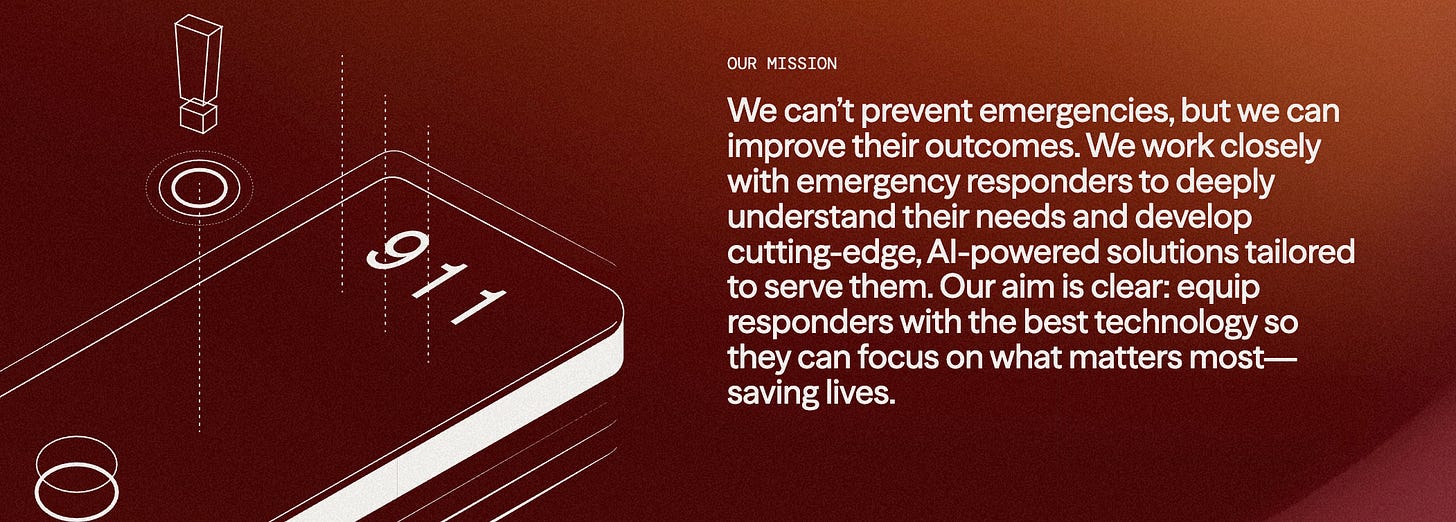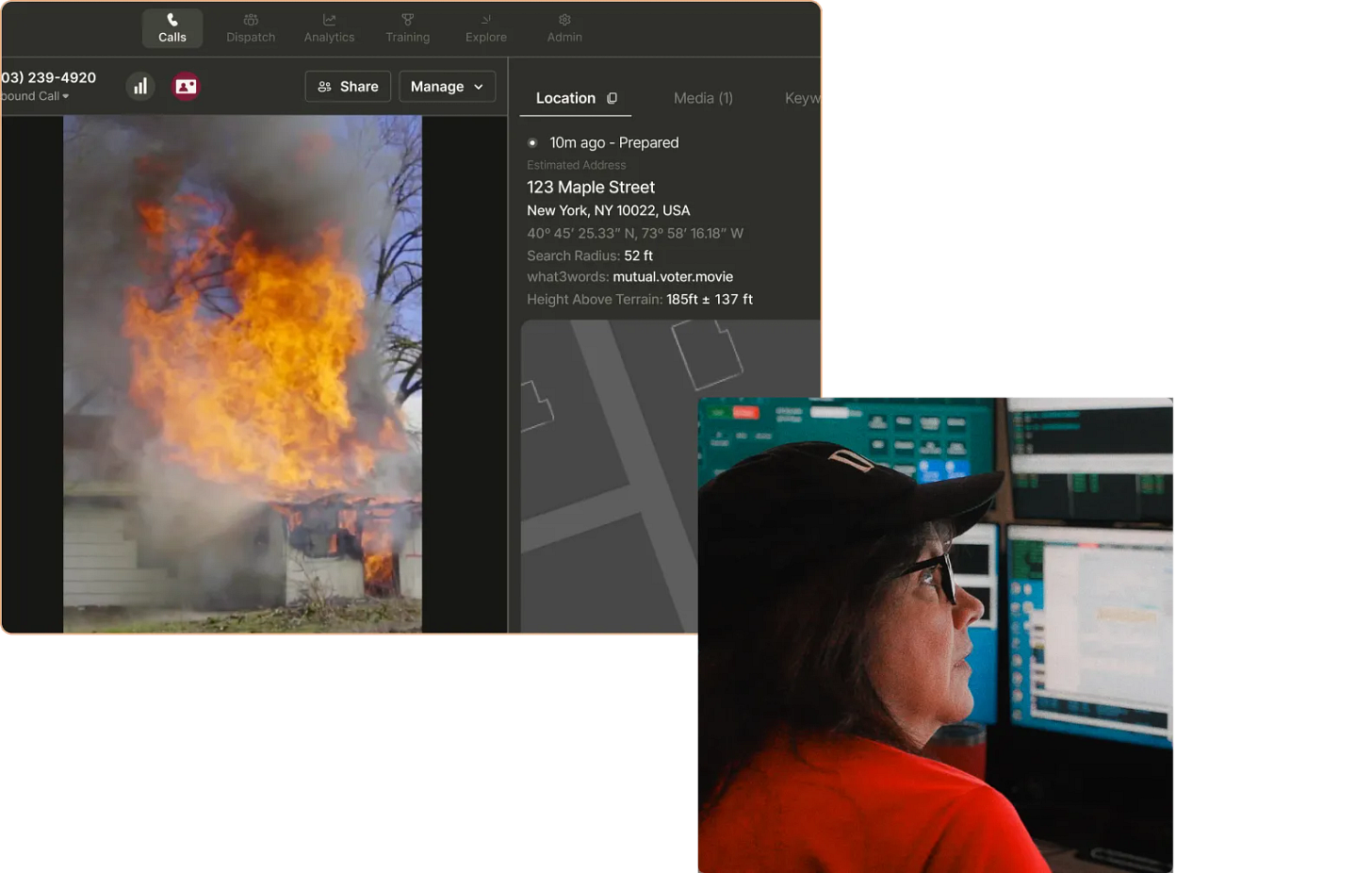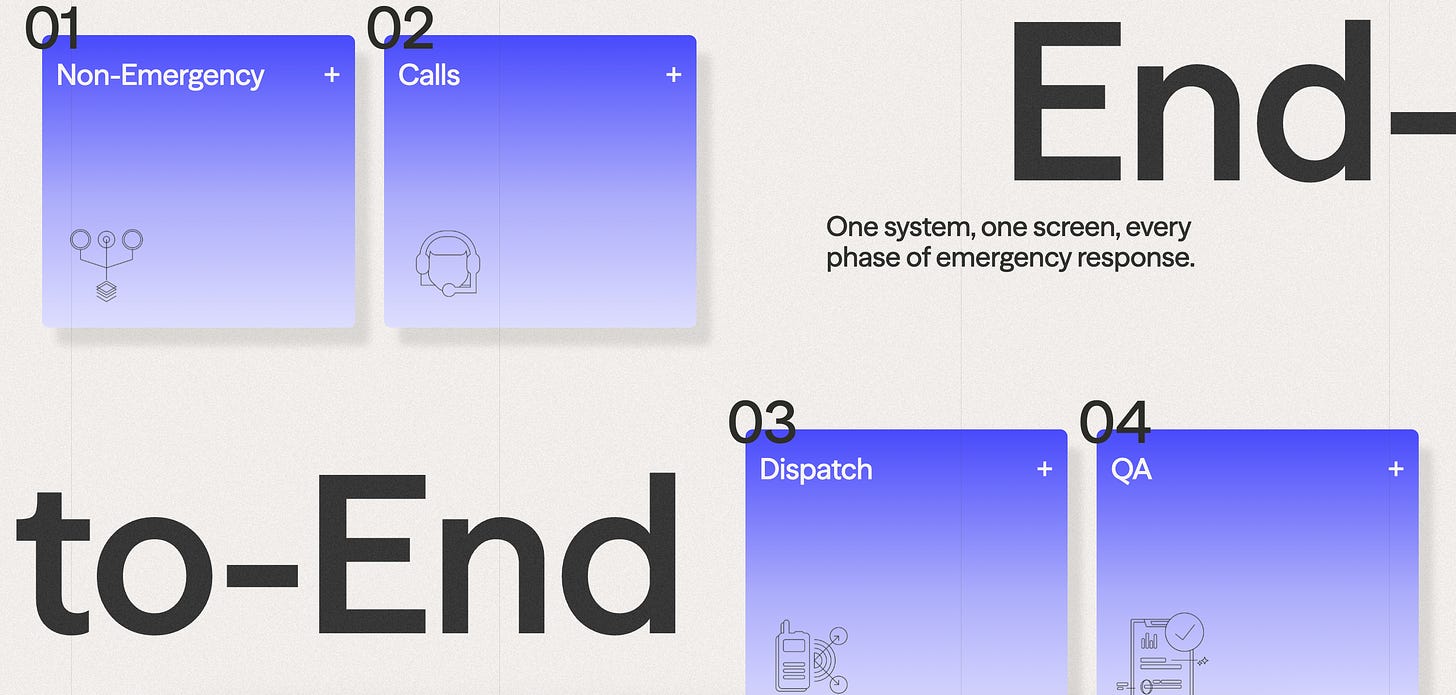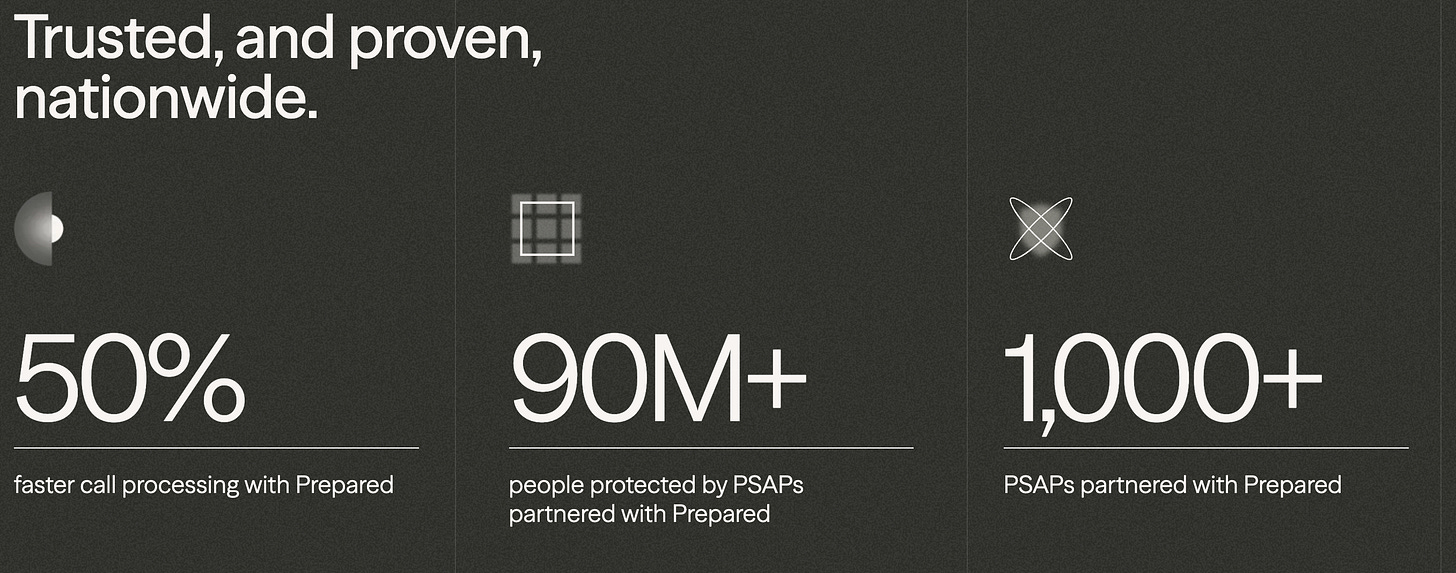Linear #137: Prepared: VerticalAI For 911 Dispatch, Do Your Homework On Investors & Acquirers
One vSaaS breakdown. One biz story. One 'how to'. In your inbox once a week.
Today’s newsletter is sponsored by Unit, the leading embedded finance platform for vertical SaaS.
Become the financial OS your customers rely on. With Unit’s Ready-to-Launch solutions, you can embed capital, banking, and bill pay in weeks - zero build required. Trusted by platforms like Bill.com, HoneyBook, and Homebase.
Learn more at unit.co
Alright, let’s get to it…
Prepared: How AI Voice Agents Are Eating 911 From The Inside Out
Most venture-backed companies die trying to rip-and-replace incumbent software. Smart ones don't. They find a wedge that gets them in the door, then slowly devour the incumbent from within.
Prepared is doing exactly this to the entire 911 emergency response system—and it's working.
The company just raised an $80M Series C led by General Catalyst, bringing total funding north of $130M. They're now in over 1,000 emergency dispatch centers protecting 100M Americans. But here's what makes this really interesting: they started by giving away their core product for free.
The Tragedy That Started It All
This isn't some Silicon Valley team who Googled "large addressable markets" and picked 911. The founders have skin in the game.
CEO Michael Chime and co-founders Dylan Gleicher and Neal Soni all grew up in communities devastated by mass shootings. Chime witnessed the aftermath of the 2012 Chardon High School shooting where three students were killed. Gleicher and Soni lived 15 minutes from Sandy Hook.
"We discovered a new gap: between communities and 911, while consumer technology had advanced rapidly, that of our emergency lines lagged. Despite 85% of the 240 million 911 calls per year originating from mobile devices, 911 technology is still built as if they're coming from landlines."
That disconnect between smartphone capabilities and 911 infrastructure became their wedge into a $36B market.
The Perfect Wedge Product
Here's where it gets clever. Most enterprise software companies try to sell comprehensive platforms on day one. Prepared started with something stupidly simple: letting 911 callers send live video and text messages to dispatchers. According to NEA's analysis, Prepared exemplifies the new playbook perfectly:
"Prepared gives away their video and text product for free, allowing PSAPs (911 response centers) to get video and text data from 911 callers. Once they land, they expand with voice agents that ingest unstructured 911 call data, transcribe, summarize, and log the data into the CAD system."
This free wedge—called Prepared Assist—solved an immediate pain point. When someone calls 911 from a smartphone, dispatchers traditionally get minimal location data and zero visual context. Prepared's wedge gave dispatchers eyes on the scene instantly.
But the real genius? They weren't just giving away free software. They were creating a new data stream that bypassed existing systems entirely.
The Land & Expand Playbook
Once Prepared lands with their free video/text tool, the expansion begins:
Phase 1: Voice AI Layer
AI agents transcribe 911 calls in real-time, extracting key details like addresses, suspect descriptions, and emergency types. This cuts Spanish-language call processing times by 66%.
Phase 2: Automated Triage
AI voice assistants handle non-emergency calls, freeing up human operators for life-or-death situations.
Phase 3: Full Platform Takeover
Quality assurance automation, supervisor dashboards, dispatch assistance—they're slowly becoming the brain of the entire operation.
The beauty is they integrate with existing CAD (Computer-Aided Dispatch) systems instead of replacing them. At first. But as one NEA partner noted, companies following this playbook "collect new data that comes through the system of actions and build to own the new system of record in the long run."
Why This Market Timing Is Perfect
Three factors make this the ideal time to build vertical AI for 911:
1. Labor Crisis
911 centers have a 25% vacancy rate. Dispatchers are burning out from understaffing and inadequate tools. AI that makes existing staff more productive isn't nice-to-have—it's essential.
2. Unstructured Data Goldmine
Every 911 call generates audio, location data, and increasingly video/text. Traditional software couldn't process this effectively. AI can.
3. Government Budget Reality
Unlike venture-funded startups that can rip-and-replace their entire tech stack, government agencies need solutions that work with existing infrastructure. Prepared's integration-first approach removes adoption friction.
The Numbers Game
While Prepared keeps revenue details private, we can reverse-engineer some estimates:
1,000+ partner agencies across 49 states
Nearly 100M people protected
Average 911 center probably pays $25K-75K annually
Estimated ARR: $20-30M range
But here's the kicker—emergency software pricing is typically based on population served or call volume. As Prepared's AI features prove their worth, they can command premium pricing. Baltimore 911 processes 1.4M calls annually. If Prepared can reduce processing time by even 30 seconds per call, that's 700,000 minutes of dispatcher time saved yearly.
At $30/hour dispatcher wages, that's $350K in labor savings from one city. Suddenly $100K+ annual contracts look like no-brainers.
The Competitive Moat
Prepared's main competition includes RapidSOS (data delivery), CentralSquare (legacy software suite), and Motorola Solutions (hardware + software). But none have Prepared's AI-first approach.
More importantly, Prepared is collecting proprietary audio/video data that competitors can't access. As NEA notes: "While generalist foundation models are trained largely on internet data, many industries require access to proprietary data or specialized data formats."
Every 911 call processed through Prepared's AI improves their models. That's a compounding data advantage that gets stronger over time.
The $10B Opportunity
Public safety represents a massive market that software has barely penetrated. NEA's analysis shows construction (4.5% of GDP) has produced multiple $10B+ software winners despite being notoriously low-tech. Public safety faces similar dynamics.
The real opportunity isn't just selling software to 6,000 US dispatch centers. It's capturing pieces of the $11T US labor market through AI automation.
If Prepared's AI can handle 50% of non-emergency calls and reduce emergency call processing times by 30%, they're not just selling software—they're selling superhuman dispatcher capabilities.
What Could Go Wrong
Government sales cycles are brutal. Security requirements are intense. One major AI failure during a life-or-death situation could destroy the company overnight.
Competition from well-funded incumbents is real. Microsoft, Google, and other cloud giants could decide to tackle 911 modernization with unlimited budgets.
And there's always the risk that foundation model improvements make specialized vertical AI less defensible over time.
The Bottom Line
Prepared represents everything compelling about vertical AI: massive addressable market, clear product-market fit, strong competitive moat from proprietary data, and founders with domain expertise and personal motivation.
They've cracked the code on government sales by leading with free value, then expanding once trust is established. The $130M raised from top-tier VCs validates both the market opportunity and execution quality.
Most importantly, they're solving a real problem that affects every American. When someone calls 911, every second matters. If Prepared's AI can shave even 30 seconds off response times, that translates to lives saved.
That's a mission worth building a $10B+ company around.
Join us at the Vertical Software Summit:
We’re almost sold out. Grab your ticket! Prices go way up September 1st. If you’ve been putting off buying your ticket, now is the time to pull the trigger.
Going to be a legendary time. Here’s a few incredible folks who are speaking:
Founder/CEO of Slice ($1B+ EV)
CRO of Owner.com ($1B+ EV)
CEO of PatientNow ($1B+ EV)
Founder & CEO of Valsoft ($1B+)
Former Chief Growth Officer of Service Titan ($1B+)
Co-Founder & CEO of Unit
Founder & GP of Euclid VC
Founder & GP of TipTop VC
GP of Frontier Growth
Managing Partner of Reformation Partners
Founder & CEO of Quadshift
Managing Partner of Blueprint equity
Founder & CEO of Bungalow
Founder & CEO of Roofer.com
Founder & CEO of Cents
Partner at Google Ventures
Co-Founders/Co-CEO’s of EvolutionIQ
Founder & CEO of Tight.com
Do Your Homework On Investors & Acquirers
Most will read the title of this section and skip right over it.
I heard this same advice SO MANY times and just said,
“Eh it’s fine, that won’t ever happen to me.”
But I want to share a sotry I recently heard in an effort to beg each and everyone of you to do your homework on anyone that invests in or buys your company. It’s so easy to get blinders and think short term but do yourself a favor and read this through to avoid a lot of serious pain and misery…
I spent a few hours recently with an entrepreneur who has sold a few companies. He shared a war story on his first exit that was so painful I couldn’t help but feel bad/angry/sad/all the emotions for him.
He had a good business, nothing crazy, but too early for PE. He received an offer for 50% up-front, 50% after one year, it was a high six figure purchase price. Classic golden handcuffs structure.
He spent a lot of time with the buyer, related to him on a personal level, the guy checked all the boxes as just a “good dude”.
So he proceeds with the deal, he gets his 50% up-front and then 12 months later the buyer comes back and says something along the lines of,
“I think you misrepresented the business so I’m not going to be paying you the remaining amount.”
This entrepreneur is buttoned up, his financials are accurate, he hit his numbers while he waited out his golden handcuffs, what it comes down to is frankly this was just total BS.
Eventually, after a lot of proving that was a completely garbage statement by the buyer, the acquirer eventually just tells him,
“Look, I am not going to pay you the remaining 50%. There are two options here. You can sue me, and spend just as much as the initial tranche of capital you received defending the case, or you can move on and deal with it.”
So the founder does some digging and finds that this guy is an active party in 10+ lawsuits of this exact nature. He basically runs this playbook for a living. He’s a former lawyer, has 5 full-time lawyers on his payroll. This is legitimately his business model.
This is an extreme example of what can go wrong, and the unfortunate truth is people like this exist in the world.
I have not personally had an example this extreme, but I have had horrendus investors who invested so little and anytime the business wasn’t performing to their expectation became litigious.
In my experience, this type of behavior almost ALWAYS comes from non-founders or folks familiar with start-ups. Think lawyers/doctors/etc. I hate to generalize, but this has just been my experience and the shared experience of so many founder friends.
Founders get how hard this game is, and as long as you tried your best and we’re honest they will have your back no matter what. Unfortunately that is just not the case for a lot of folks.
So the moral of the story — please be so careful when raising capital or selling your business. Do your homework. Don’t call the references they provide you, call the folks they don’t bring up / mention. Pay a service to research lawsuits that they have been party to, etc.
It’s so so important.
Have a product or service that would be great for our audience of vertical SaaS founders/operators/investors? Reply to this email or shoot us a note at ls@lukesophinos.com









